 Finance
Finance

Swiss-UK tax deal points to other tax havens
 (Telegraph): The recent Swiss-UK tax agreement is likely to give HMRC the ammunition to focus on other tax havens.On October 6, HMRC released the full details of its controversial deal with Switzerland, designed to enabling the taxation of undeclared assets hidden in Swiss bank accounts in return for account holders retaining their anonymity. As governments across the globe try to minimise their deficits by tapping into unpaid tax bills, "tackling offshore tax evasion" has become the buzz phrase of the moment. The Swiss-UK agreement adds another string (or two) to the UK government’s bow in this respect, due to information sharing provisions which help HMRC decide "where next" in the fight against tax evasion.
(Telegraph): The recent Swiss-UK tax agreement is likely to give HMRC the ammunition to focus on other tax havens.On October 6, HMRC released the full details of its controversial deal with Switzerland, designed to enabling the taxation of undeclared assets hidden in Swiss bank accounts in return for account holders retaining their anonymity. As governments across the globe try to minimise their deficits by tapping into unpaid tax bills, "tackling offshore tax evasion" has become the buzz phrase of the moment. The Swiss-UK agreement adds another string (or two) to the UK government’s bow in this respect, due to information sharing provisions which help HMRC decide "where next" in the fight against tax evasion.
Specifically, the Swiss banks have agreed to inform HMRC of the top ten destinations to which money removed from Switzerland is sent. Information to be provided will include the number of people who transferred their funds to each destination between the date of signature of the agreement and the last day of the month, following a period of four months after the date of entry into force of the agreement.

Tax haven crackdown yields €14billion
(Reuters): An international drive against offshore tax havens has reaped nearly €14billion from would-be tax evaders, the OECD said on Tuesday. Some 100,000 taxpayers in 20 major economies surveyed by the OECD have revealed previously undetected offshore assets in the last two years, allowing tax authorities to collect the equivalent of nearly $19 billion. "As cash-strapped governments look to pay down their deficits, this will make a substantial contribution to fiscal consolidation," Secretary General Angel Gurria said at the opening of a two-day meeting on tax transparency.
"Just as important — most of the additional revenues has been secured from citizens trying to evade taxes," he added. "At a time when many governments are forced to ask their citizens to accept higher taxes and reduced public services, everyone must pay their fair share."

Shares tumble as FBI probes Olympus scandal
 (Reuters): The FBI is investigating the massive advisory fee involved in Olympus Corp's takeover of a British company, a person familiar with the probe said, in a deepening scandal that has wiped out more than half the company's value. The British CEO who says he was fired for questioning the $687million payment to advisers in the $2.2billion takeover of medical equipment maker Gyrus has called on authorities in both Britain and Japan to also investigate the payments. The endoscope and camera maker said last week it would commission its own independent review of past acquisitions, although the ousted CEO, Michael Woodford, said the company was playing for time.
(Reuters): The FBI is investigating the massive advisory fee involved in Olympus Corp's takeover of a British company, a person familiar with the probe said, in a deepening scandal that has wiped out more than half the company's value. The British CEO who says he was fired for questioning the $687million payment to advisers in the $2.2billion takeover of medical equipment maker Gyrus has called on authorities in both Britain and Japan to also investigate the payments. The endoscope and camera maker said last week it would commission its own independent review of past acquisitions, although the ousted CEO, Michael Woodford, said the company was playing for time.
It carried out a review in 2009 that concluded no management wrongdoing, documents he provided show.
The 92-year-old company is struggling to contain the crisis following Woodford's revelations. Olympus acknowledges it made the advisory fee payment and denies any wrongdoing. But it has not explained why it agreed to a fee that amounted to about a third of the value of the takeover when such fees normally come to about 1 percent. At $687 million, the fee is the largest on record.
Woodford, 51, who spent three decades at Olympus, has identified the advisory firms involved in the takeover as New York-based AXES America LLC and AXAM Investments Ltd in the Cayman Islands.
The Federal Bureau of Investigation in New York is currently investigating the payment, according to the person familiar with the investigation. This person was not authorized to speak publicly as the investigation is ongoing.

US confused over real financial crime, says lawyer
 (CNS): Onshore jurisdictions such as the United States which accuse offshore countries such as the Cayman Islands of harbouring stolen assets in bank accounts do not understand the concept of ‘stolen assets’ and are passing the buck by not dealing with the origins of crime in their own countries, John Masters, Senior Crown Counsel-International Cooperation for the Cayman Islands, has said. Speaking at a compliance conference last week, Masters explained the difference between proceeds of crime and stolen goods but he said onshore jurisdictions were getting the two confused and then pointing the finger at jurisdictions like Cayman.
(CNS): Onshore jurisdictions such as the United States which accuse offshore countries such as the Cayman Islands of harbouring stolen assets in bank accounts do not understand the concept of ‘stolen assets’ and are passing the buck by not dealing with the origins of crime in their own countries, John Masters, Senior Crown Counsel-International Cooperation for the Cayman Islands, has said. Speaking at a compliance conference last week, Masters explained the difference between proceeds of crime and stolen goods but he said onshore jurisdictions were getting the two confused and then pointing the finger at jurisdictions like Cayman.
Masters said the John Grisham image of criminals bringing in bags of money could not be a reality because it was a physical impossibility to transfer huge sums of money in this way when the US was talking about a trillion dollars of so-called ‘stolen assets’, he said.
During a session entitled There are no stolen assets in off-shore bank accounts – who is truly responsible for financial crime and balances appearing in offshore accounts? at this month’s Global Compliance Solutions Conference held at the Marriott Beach Resort, the lawyer said that if people tried to bring in large volumes of cash, they would be stopped by border control as a declaration has to be made if large sums were being brought into the islands.
And even if they got past the border, they would not be able to place it with local banks because they must file a suspicious activity report on large sums or risk prosecution themselves.
Masters also challenged the notion that such funds were even ‘stolen’ in the first place, explaining that when a bank customer makes a deposit, they were in essence creating a debtor/creditor relationship,whereby the bank promises to pay the customer the cash upon demand.
When a wire transfer of funds takes place, there is no actual movement of property; rather, what actually happens is a transfer of a debt. To underline the point he used the analogy of a criminal stealing the Mona Lisa painting, saying that the cash paid by someone for the stolen painting was not itself stolen property, although it was the proceeds of crime.
“All stolen property is the proceeds of crime but not all proceeds of crime are stolen property,” he explained, adding that a recent ruling in the UK House of Lords backed up this view.
Masters said it was important that the wrong label was not attributed in these cases because certain words conjured up particular negative sentiments and responsibility just by the label that was attached. He went on to say that there was a need for further clarity because once a jurisdiction was identified as in possession of stolen property there was a suggestion that theywere somehow at fault.
The reality was that if a jurisdiction was in possession of the proceeds of crime, they often don’t know about it, Masters said. He illustrated his point when he describe the concept of a corrupt politician in the US receiving a bribe of a million dollars and spending it on vacation, jewellery, cars and transferring half of the money to a bank account in the Cayman Islands.
“How often would you hear the travel agent or jeweller criticized for taking the money?” he said. “Yet when it comes to the Cayman Islands it is infamously described as a haven for stolen property.”
By describing the money that gets sent to the Cayman Islands as “stolen assets” it shifted the responsibility from the jurisdiction where the offence was committed to the jurisdiction where the proceeds of crime had ended up, he said. “There has literally and metaphorically been a passing of the buck,” he said.
Offshore jurisdictions were, of course, eager to repatriate illicit funds, Masters said, but it was difficult for the authorities in the Cayman Islands to make their investigations when the crime was committed onshore. That said, investigators in Cayman were working extremely hard to track down the criminals in the onshore country, even when manpower in countries like the US were many times that of officers in the Cayman Islands.
When it came to transferring money via wire transfer, Masters wondered, if the money transfer to an offshore bank was suspicious, why the bank making the transfer in the first place had not also thought the transfer was suspicious. Masters said that even though places like the US believed that jurisdictions such as Cayman were at fault, the Cayman Islands were actually the solution, an attitude evident in the strength of Cayman’s laws, which he said were equalled by none.
“In reality when the Cayman Islands confiscates the property it has remedied the problem of some other jurisdiction and is never part of the problem,” he said, adding that it was, however, easy for the onshore country to shift the blame to the offshore.

Corporations lobby for tax break on offshore profits
 (iwatch): Goaded by battalions of corporate lobbyists, members of Congress are working to give a select group of US multinational firms like Apple, Oracle and Pfizer a lavish tax break on a trillion dollars stashed offshore. The goal is to generate jobs and investment, but the offshore tax holiday was tried before, in 2004, and the lion’s share of the benefits went not to unemployed workers and their families, but to corporate shareholders and executives. With today’s high unemployment, and soaring costs for college, health care and other family essentials, critics are asking why an elite class of corporations and their shareholders should get a huge tax break on overseas profits.
(iwatch): Goaded by battalions of corporate lobbyists, members of Congress are working to give a select group of US multinational firms like Apple, Oracle and Pfizer a lavish tax break on a trillion dollars stashed offshore. The goal is to generate jobs and investment, but the offshore tax holiday was tried before, in 2004, and the lion’s share of the benefits went not to unemployed workers and their families, but to corporate shareholders and executives. With today’s high unemployment, and soaring costs for college, health care and other family essentials, critics are asking why an elite class of corporations and their shareholders should get a huge tax break on overseas profits.
The proposed tax holiday could cost the Treasury from $40 billion to $80 billion over the next decade, and the high cost of the measure is one reason that its prospects for passage are mixed.
But 73 members of Congress, both Republicans and Democrats, have signed up as co-sponsors. And cash-rich mega corporations are pushing hard for the tax break.
A number of trade groups and corporations that would benefit have joined in a coalition called WIN America. New lobbying disclosure reports show that the group and its member firms have spent millions of dollars, and employed dozens of lobbyists, to press for the tax break, according to an analysis by iWatch News.

Swiss banks ready to give up clients to IRS
 (Reuters):Swiss banks will probably settle a sweeping US probe of offshore tax evasion by paying billions of dollars and handing over names of thousands of Americans who have secret accounts, according to two people familiar with the matter. U.S. and Swiss officials are concluding negotiations on a civil settlement amid U.S. criminal probes of 11 financial institutions, including Credit Suisse Group AG (CSGN), suspected of helping American clients hide money from the Internal Revenue Service, according to five people with knowledge of the talks who declined to speak publicly because they are confidential.
(Reuters):Swiss banks will probably settle a sweeping US probe of offshore tax evasion by paying billions of dollars and handing over names of thousands of Americans who have secret accounts, according to two people familiar with the matter. U.S. and Swiss officials are concluding negotiations on a civil settlement amid U.S. criminal probes of 11 financial institutions, including Credit Suisse Group AG (CSGN), suspected of helping American clients hide money from the Internal Revenue Service, according to five people with knowledge of the talks who declined to speak publicly because they are confidential.
Switzerland, the biggest haven for offshore wealth, wants an end to new US probes while preserving its decades-old tradition of bank secrecy, the people said. The U.S. seeks data on Americans who have dodged US taxes and a pledge by Swiss banks to stop helping such clients, according to the people.
The Swiss reached accords this year with Germany and the UK on untaxed assets.
“The Swiss would like to get out of this by paying money, and they’ve done that with other countries,” said tax attorney H. David Rosenbloom of Caplin & Drysdale Chartered in Washington, who isn’t involved in the talks. “For the U.S., it’s not primarily a money question. It’s a matter of making sure the laws apply fairly among taxpayers.”

Local firm heads off to the Big Apple
 (CNS): Fund governance firm dms Management Ltd has just announced the opening of its New York office, dms Management (USA) Inc, located at the Rockefeller Center and headed by Executive Director Kathleen Celoria. The move will aid in the better governance of funds, the firm said. Celoria said the New York office would fortify the firm’s existing relationships with US stakeholders, many of whom, she said, were based in New York, adding that the move will help make the firm’s governance work more accessible and transparent to the funds they serve, as well as the investors.
(CNS): Fund governance firm dms Management Ltd has just announced the opening of its New York office, dms Management (USA) Inc, located at the Rockefeller Center and headed by Executive Director Kathleen Celoria. The move will aid in the better governance of funds, the firm said. Celoria said the New York office would fortify the firm’s existing relationships with US stakeholders, many of whom, she said, were based in New York, adding that the move will help make the firm’s governance work more accessible and transparent to the funds they serve, as well as the investors.
Don Seymour, dms Management Ltd’s Managing Director said that the New York office will serve the increasing demand for institutional fund governance for onshore funds.
“The simple truth for investors is that many of the real life governance failures they suffered during the financial crisis were attributed to offshore funds feeding into onshore funds without proper governance. They’re now focused, correctly we believe, on a results-driven governance approach to avoid a repeat of those experiences,” Seymour said, confirming that DMS had conducted regular consultations with major institutional investors since the 2008 financial crisis.
Seymour went on to say that DMS believed that 2012 will be a pivotal year for fund governance with America’s Securities and Exchange Commission fund governance standards likely dominating the agenda.
“We want to do everything we can to advance effective fund governance standards and our New York office is an integral part of our commitment,” he confirmed.

Watchdog gives access to Cayman’s financial court
 (CNS): The Miami based offshore watchdog is giving its members complete access to all of the actions filed at the Financial Services Division of the Grand Court of the Cayman Islands back to the first case ever heard in the specialist court 2 November’ 09. OffshoreAlert said that except where a case has been sealed by the court or is otherwise unavailable, copies of each writ, petition, summons, or other initial filing, can now be viewed by clicking on 'Cayman Islands' in the 'Offshore Courts' section in the right-hand column of the home-page or can be found through the new-look website’s search function.
(CNS): The Miami based offshore watchdog is giving its members complete access to all of the actions filed at the Financial Services Division of the Grand Court of the Cayman Islands back to the first case ever heard in the specialist court 2 November’ 09. OffshoreAlert said that except where a case has been sealed by the court or is otherwise unavailable, copies of each writ, petition, summons, or other initial filing, can now be viewed by clicking on 'Cayman Islands' in the 'Offshore Courts' section in the right-hand column of the home-page or can be found through the new-look website’s search function.
The first action ever dealt with by the financial court was a petition for the liquidation of Laurus Offshore Fund, Ltd. to continue under the supervision of the Court and for Gordon MacRae and G. James Cleaver to be appointed as Joint Official Liquidators.
OffshoreAlert said it also has copies of many initial filings at the Civil Division of the Grand Court of the Cayman Islands over the last 18 months. “We are continuing to back-date these records in order to offer subscribers more comprehensive coverage,” said owner DavidMarchant. “OffshoreAlert has also started obtaining copies of initial filings at the Commercial and Civil Divisions of the British Virgin Islands High Court, which can also be found in our database.”
The website’s database now contains details of more than 20,000 civil actions filed at the Grand Court of the Cayman Islands, Bermuda Supreme Court or the British Virgin Islands High Court.
“We update our records on a regular basis, usually weekly, in order to bring subscribers details of the latest cases” Marchant said.
www.offshorealert.com

Tax activist says trust expert proved TIEAs are futile
 (CNS): A tax campaigner and member of the Tax Justice Network has said comments made at a recent conference in the Cayman Islands illustrate that Tax Information Exchange Agreements are futile. Robert Shepherd from MourantOzannes Guernsey office said that TIEAs were created by onshore governments to try and force offshore institutions to provide more information to bring in more revenue but there were still ways that trust professionals could protect beneficiaries and confidentiality because of the hoops tax authorities needed to go through. Speaking to the UK’s Daily Telegraph, Richard Murphy said this proved that TIEAs don’t work because of this very reason.
(CNS): A tax campaigner and member of the Tax Justice Network has said comments made at a recent conference in the Cayman Islands illustrate that Tax Information Exchange Agreements are futile. Robert Shepherd from MourantOzannes Guernsey office said that TIEAs were created by onshore governments to try and force offshore institutions to provide more information to bring in more revenue but there were still ways that trust professionals could protect beneficiaries and confidentiality because of the hoops tax authorities needed to go through. Speaking to the UK’s Daily Telegraph, Richard Murphy said this proved that TIEAs don’t work because of this very reason.
He argued that this was why the TIEA should be replaced in favour of an automatic exchange of information on demand. "TIEAs don't work. Everyone knows it. As things stand, client funds can be moved out of a jurisdiction before an enquiry can develop, thwarting it before it really gets underway," Murphy told the UK’s Daily Telegraph newspaper on Wednesday.
"In order to make a successful TIEA request you need to correctly identify the individual, which is made virtually impossible by a combination of legal entities and professional services designed to ensure he or she remains anonymous. There is, for example, no public documentation relating to trusts", he added.
"It is exceptionally difficult to link bank accounts operated by a company in turn controlled by a trust with a particular taxpayer in another jurisdiction who may or may not be settler and or beneficiary of that arrangement."
Shepherd told an audience at Mourant Ozannes first trust conference to be held in Cayman last week that despite the TIEA there were still ways that trust professionals could protect beneficiaries and confidentiality. On the face of them TIEAs appeared “fearsome”, with one tax authority forcing another to disclose information on foreign nationals, but actually Shepherd said there was a good deal that trust professionals could do to honour obligations of confidentiality.

$2billion Islamic bond programme set up in Cayman
(Reuters): Goldman Sachs has registered a $2 billion Islamic bond programme, providing further evidence of conventional borrowers looking to sharia-complaint funding sources as market volatility makes raising debt finance more difficult. The investment bank has set up the Cayman Islands-registered Global Sukuk Company Limited special purpose vehicle to issue murabaha-structured sukuk, according to a base prospectus filed with the Irish Stock Exchange. Murabaha is a cost-plus-profit arrangement which complies with Islamic law.
"In the current environment it is unsurprising to see borrowers turning to markets in which they believe liquidity is still available," Chavan Bhogaita, head of markets strategy unit at National Bank of Abu Dhabi, said. "(Goldman Sachs' decision to tap sukuk) is simply a reflection of the very challenging environment in which we currently find ourselves, and the relative strength of the sukuk market at present given that we are seeing solid demand for assets in this space."